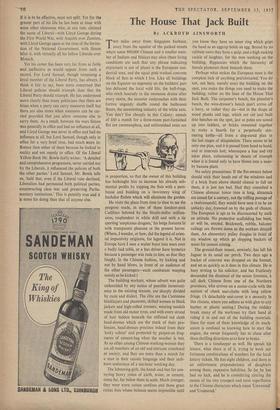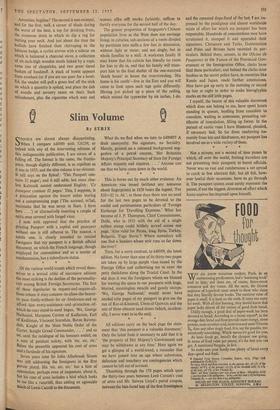The House That Jack Built
By ACKROYD AINSWORTH Two miles away from Singapore harbour, I away from the squalor of the packed streets where some 800,000 Chinese and a smaller num- ber of Indians and Malays stay alive (their living conditions are such that any phrase indicating enjoyment is out of place) is the European resi- dential area, and the squat pink-washed concrete block of flats in which I live. Like all buildings on the Equator no ingenuity on the builders' part has defeated the local wild life, the bull-frogs, who retch hoarsely in the monsoon drains after every storm, the monster cockroaches with their furtive ungainly shuffle round the bathroom floors, the unremitting industry of the white ants. You don't live cheaply in this Colony; rentals of £60 a month for a three-room part-furnished flat are commonplace, and unfurnished rents are n proportion, so that the owner of this building has bethought him to increase his already sub- stantial profits by topping the flats with a pent- house and building on "a two-storey wing of bachelor flatlets which will eliminate the garden.
He visits the place from time to time to see the progress made, in one of those fondant-pink Cadillacs beloved by the Straits-dollar million- aires, resplendent in white drill and with a tie sporting 'auspicious dragons,' his beige features lit with transparent pleasure at the present havoc. (Where, I wonder, or how, did the legend of orien- tal impassivity originate, for legend it is. Not in Europe have I seen a waiter burst into tears over a badly laid table, or a bus driver have hysterics because a passenger was rude to him, so that they fought, in the Chinese fashion, by kicking and not by hand blows, in front of an audience of the other passengers—each combatant weeping noisily as he kicked.) The building workers, whose advent was quite unheralded by any notice of possible inconveni- ence to the existing tenants, are sharply divided by caste and dialect. The elite are the Cantonese bricklayers and plasterers, skilled women in black jackets and high-rolled trousers, wearing sandals made from old motor tyres, and with every strand of hair hidden beneath the stiffened red cloth head-dresses which are the mark of their pro- fession, head-dresses precious indeed from their 'lucky colour' and protected by pinned-on frag- ments of cement-bag when the weather is wet. As so often among Chinese working-women they are all members of an old and intricate sisterhood or society, and they are more than a match for a man in their caustic language and their stub- born endurance of a ten-hour working day.
The labouring girls, the hands and feet for con- veying heavy yokes of earth, water, or cement, come far, far below them in scale. Much younger, they wear worn cotton samfoos and those great rattan hats whose balance seems impossible until you know they have an inner ring which grips the head as an eggcup holds an egg. Bound by no • celibate vows they have a quip, and a high racking cackle of laughter, for the men working on the building, flippancies which the hierarchy of female plasterers think beneath them.
Perhaps what strikes the European most is the complete lack of anything prefabricated. You do not, out here, merely erect the building on the spot, you make the things you need to make the building, rather on the lines of the House That Jack Built. The carpenter's bench, the plumber's bench, the wire-drawer's bench don't arrive off a lorry, or rather they do—but in the shape of wood planks and logs, which are cut and built into benches on the spot, just as poles are sawed up into ladders, or bricks cemented together to make a hearth for a perpetually sim- mering kettle—all from a dog-eared plan in the last stages of dilapidation. There seems to be only one plan, and it is passed from hand to hand, and at intervals lost; whereupon a hue and cry takes place, culminating in shouts ,of triumph when it is found only to have blown into a near- by banana plant.
No safety precautions. If the flat-owners below should stick their heads out of the windows and if a brick from ,above should chance to fall on them, it is just too bad. Had they consulted a Chinese almanac (since time is long, almanacs are issued for a century, not the trifling passage of a twelvemonth), they would have seen it to be an unlucky day, frowned on by the gods of chance.
The European is apt to be disconcerted by such an attitude. No protective scaffolding has been, or will be, erected. Brickwork, rubble, balcony railings are thrown down as the workers discard them. An elementary pulley dangles in front of my window up which go slopping buckets of water for cement mixing.
The ground-floor tenant, unwisely, has left his Jaguar in its usual car porch. Two days ago a bucket of concrete was dropped on the bonnet, and set as quickly as it does in this climate. He is busy writing to his solicitor, and has fruitlessly demanded the dismissal of the senior foreman, a tall dark Chinese from one of the Northern provinces, who arrives on a motor-cycle with the nattiest of check seat-cloths with long yellow fringe. (A detachable seat-cover is a necessity in this climate, where you adhere as with glue to any leather, or plastic seating.) During the midday break many of the workmen try their hand at riding it in and out of the building materials. Since for most of them knowledge of its mech- anism is confined to knowing how to start the engine, the owner frequently has to chase after them shrilling directions as to how to brake.
There is a timekeeper as well. He spends his leisure, what there is of it, trying to work out fortunate combinations of numbers for the local lottery tickets. He has eight children, and there is an unfortunate preponderance of daughters among them, expensive liabilities. So far. he has had no luck, and he is considering altering the names of the two youngest and most superfluous to the Chinese characters which mean 'Unwanted' and 'Undesired.' Amenities, hygiene? The second is non-existent, and for the first, well, a corner of shade during the worst of the heat, a tap for drinking from, the monsoon drain in which to dip a rag for Wetting your neck. And just about the time the bulbuls have finished their chirruping in the hibiscus hedge, a cyclist arrives with a sidecar on Which is balanced a charcoal stove, a collection of six-inch-high wooden stools linked by a rope, some tins of chopsticks, and two great tiered baskets of foodstuff. A stack of bowls appears from nowhere (or if you are too poor for a bowl- ful, the vendor will pull a green leaf off the stick on which a quantity is spiked, and place the dab Of noodle and savoury sauce on that). Such refreshment, plus the cigarettes which men and women alike will smoke furiously, suffices to fortify everyone for the second half of the day.
The greater proportion of Singapore's Chinese population lives as the West does not envisage living, in cubicles, sub-sections of a room divided by partitions into stalls a few feet in dimension, without light or water; and not singly, but in whole families to a stall. A workman fatally ill may know that his cubicle has literally no room for him to die in, and that his family will trans- port him to the final shelter of the one-storeyed 'death house' to lessen the overcrowding. 'His home is his castle'—live in the East and you will come to look upon such tags quite differently. Having just picked up a piece of the ceiling, which missed the typewriter by six inches, I do.



































 Previous page
Previous page